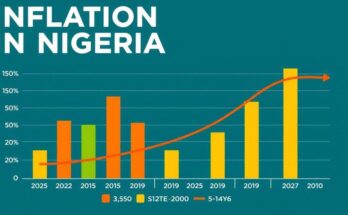The Trump administration plans to impose tariffs on imports from Canada, Mexico, and China, which may lead to increased prices for essential goods such as gasoline and groceries. The tariffs—25% for Canada and Mexico and 10% for China—spark potential retaliatory measures from these countries, raising concerns of a trade conflict. Experts warn this policy could significantly impact U.S. consumers and international trade relations.
The Trump administration is poised to implement tariffs on goods imported from Canada, Mexico, and China, effective Saturday. This decision places significant pressure on these key trade partners and could lead to higher prices for essential goods, including gasoline and groceries. The proposed tariffs include a 25% tax on products from Canada and Mexico and a 10% tax on those from China.
In response to these tariffs, leaders from Canada and Mexico indicated they would retaliate, raising concerns about a potential trade war. Economic experts warn that the imposition of such tariffs will likely result in increased prices for U.S. consumers as businesses often transfer some of these costs onto shoppers. Fresh produce and auto parts are among the range of products that could see price hikes.
At a briefing, U.S. Press Secretary Karoline Leavitt emphasized that the tariffs aim to address illicit drug trafficking linked to these nations. Leavitt stated, “Canada, Mexico and China have all enabled illegal drugs to pour into America.” President Trump echoed this sentiment regarding the tariffs shortly after winning the November election, asserting they fulfill campaign promises.
Canadian Prime Minister Justin Trudeau and Mexican President Claudia Sheinbaum swiftly condemned the tariffs, each threatening to respond decisively. Although President Sheinbaum expressed skepticism regarding the tariffs, maintaining that Mexico was prepared for any eventuality, both nations remain concerned about the implications of this policy.
The oil industry is also at the forefront of this tariff discussion, with Mexico and Canada accounting for 70% of U.S. crude oil imports, crucial for gasoline production. Experts predict that these tariffs could raise gas prices by as much as 70 cents per gallon, though there is uncertainty about potential exemptions for oil imports, which the administration has yet to clarify.
This tariff policy could also impact a wide array of fresh agricultural products, where domestic alternatives may not sufficiently replace imports. Jason Miller, a supply chain management professor, noted that prices for vegetables and fruits may significantly rise should tariffs be enforced. Likewise, the automobile industry, closely tied with Canada and Mexico, faces potential price increases for cars and parts.
While inflation has receded from its peak of over 9% in June 2022, recent trends indicate rising prices. During the briefing, Leavitt referenced Trump’s earlier success in maintaining low inflation rates during his first term, stating, “Americans who are concerned about increased prices should look at what President Trump did in his first term. He effectively implemented tariffs and the average inflation rate during the first Trump administration was 1.9%.”
The forthcoming tariffs by the Trump administration reflect ongoing tensions with major American trade partners. These policies aim to address issues surrounding illicit drug importation but raise concerns over consumer inflation and economic stability. Insights into potential responses by Canada and Mexico further highlight the risk of escalating trade relations in response to economic pressures. The intricate connections between tariffs, oil imports, and food prices underscore the complexity of the global supply chain in contemporary trade dynamics.
In summation, the impending tariffs on imports from Canada, Mexico, and China signal a significant policy shift by the Trump administration with implications for U.S. consumers and international relations. The forecasts of price increases across numerous essential products, coupled with potential retaliatory measures from these trade partners, illustrate the intricate web of global commerce and its susceptibility to political decisions. These developments call for close monitoring of evolving economic conditions and trade negotiations.
Original Source: abcnews.go.com




